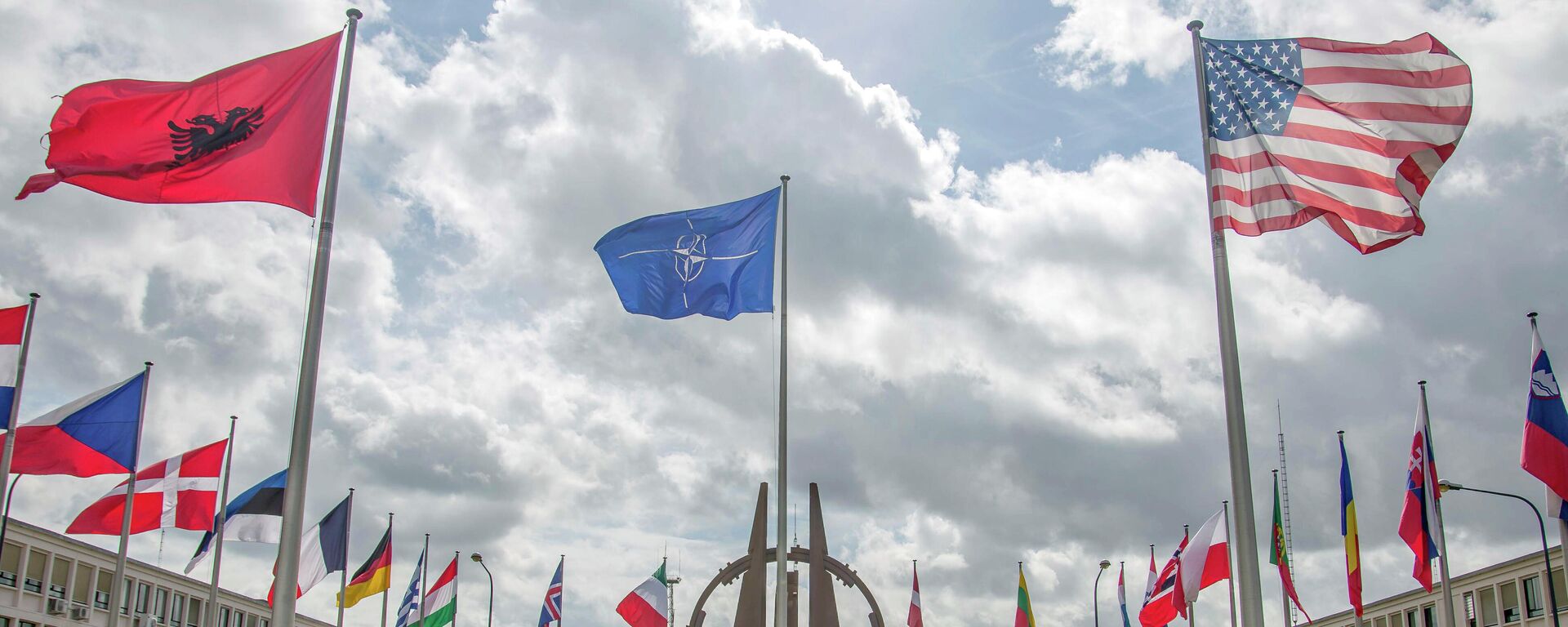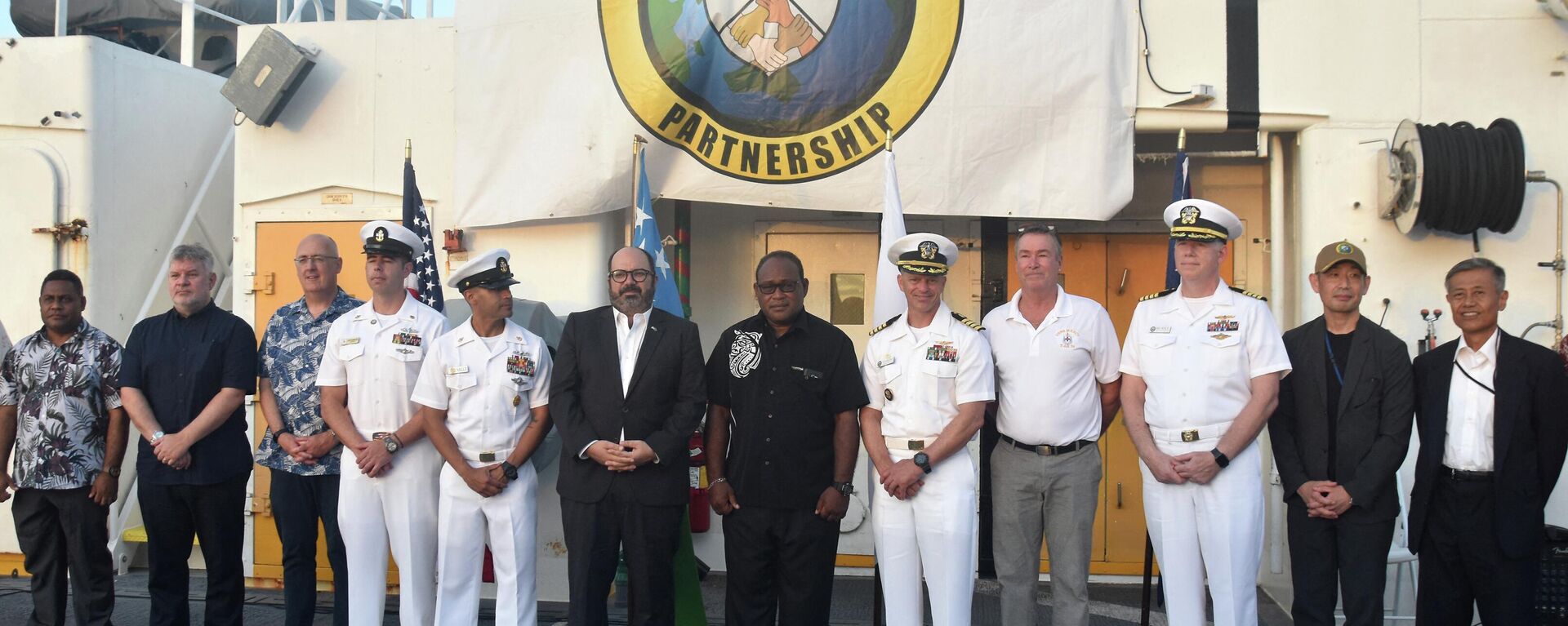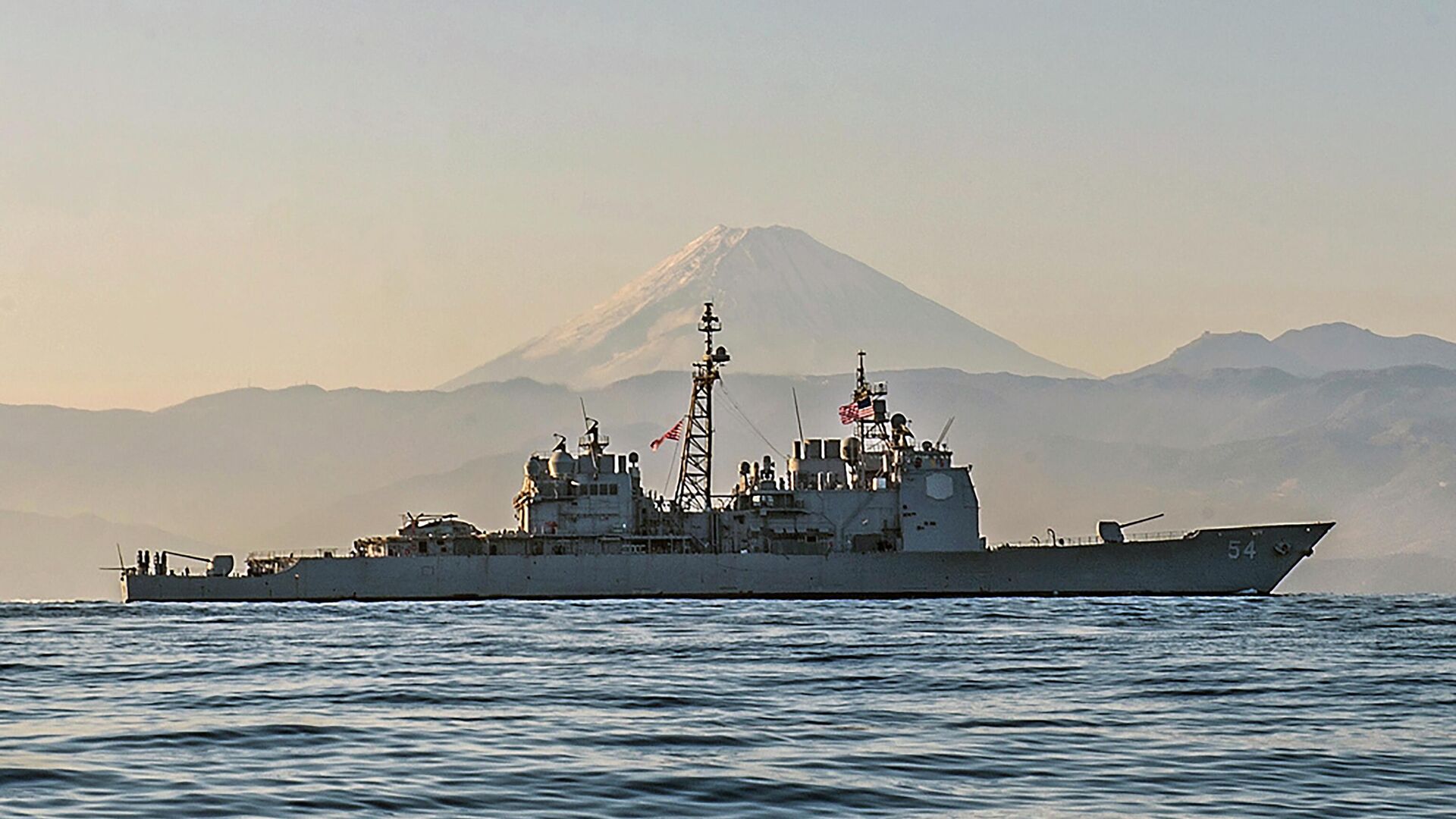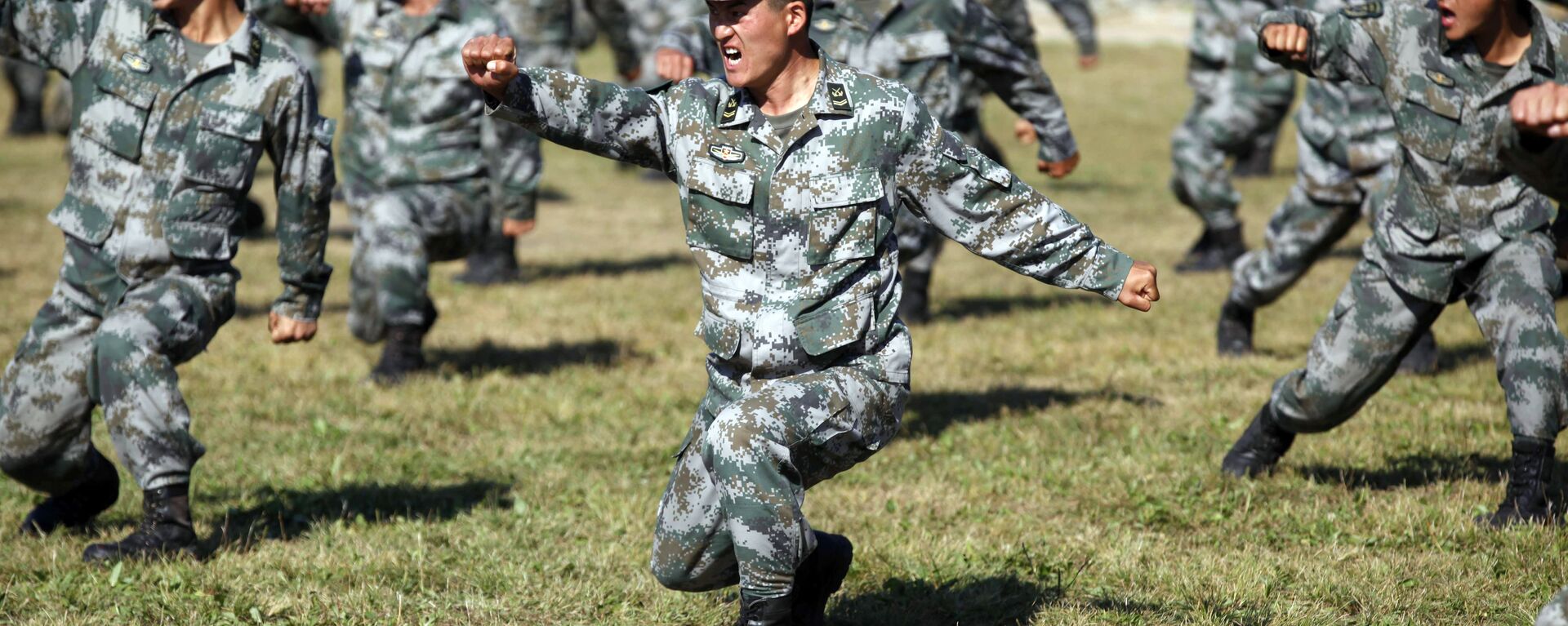https://sputnikglobe.com/20221004/scholar-us-escalates-rhetoric-to-pressure-china-ahead-of-midterms--beijings-20th-party-congress-1101503544.html
Scholar: US Escalates Rhetoric to Pressure China Ahead of Midterms & Beijing’s 20th Party Congress
Scholar: US Escalates Rhetoric to Pressure China Ahead of Midterms & Beijing’s 20th Party Congress
Sputnik International
The defense chiefs of the US, Australia and Japan held the Trilateral Defense Ministers’ Meeting (TDMM) in Hawaii on October 1. In it, they pledged to... 04.10.2022, Sputnik International
2022-10-04T13:50+0000
2022-10-04T13:50+0000
2022-10-04T13:49+0000
analysis
us
asia
china
nato
australia
japan
military & intelligence
https://cdn1.img.sputnikglobe.com/img/07e6/09/0f/1100801871_0:160:3075:1890_1920x0_80_0_0_88a5a32839112c79e6569d7c4c988db0.jpg
"I think the alliance is preparing for an eventuality of a contingency over Taiwan," said Dr. Victor Teo, a political scientist specializing in Asia Pacific international relations. "At the same time, the ratcheting-up of tensions is critical for alliance politics as well as US domestic politics. The looming US midterm elections mean that the Democrats, led by [US President Joe] Biden, cannot be seen as soft on China. Doing what they are doing now essentially allows them to seize the issue from the Republicans and prevail in their domestic political struggle. However, I do not believe that the United States is out to start a war with China."The TDMM took place in Hawaii on October 1. The joint statement placed an emphasis on what they called China’s "increasingly aggressive and bullying behavior in the Taiwan Strait and elsewhere in the region". In the course of the meeting, the participants also "strongly condemned" China’s ballistic missile launches during massive military exercises surrounding the island of Taiwan in August.US Secretary of Defense Lloyd Austin urged his counterparts to strengthen their trilateral defense cooperation, "including reaching out together in the region and expanding our trilateral military activities and deepening our technology cooperation." According to Austin, the trilateral alliance "makes the region safer."The latest tensions over the island of Taiwan, considered an inalienable part of the People's Republic of China by Beijing, were ignited by the trip of US House Speaker Nancy Pelosi to the region in early August. This was the first time a high-ranking US politician visited the island in 25 years. Prior to Pelosi's visit, Chinese President Xi Jinping warned the White House against "playing with fire" in the region. After the House speaker left the island, China kicked off a series of unprecedented live-fire drills in six locations around Taiwan. In addition, US President Joe Biden repeatedly vowed to "defend" the island militarily from China. Each time, the White House backpedalled on the president's remarks, asserting to Beijing that it continues to adhere to the One-China principle.Still, Biden's statements and the White House's clarifications are still creating some "ambiguity… except this is done differently," according to the scholar.The scholar pointed out that the joint statement of the participants of the trilateral meeting targets both Beijing and Moscow. According to him, "the US has always planned strategically for a two-theatre war."The reason behind the US' provocative behavior simultaneously targeting Russia and China stems from Washington's desire to maintain its interests in the respective regions; preserve its image as a leader of the NATO bloc and its alliance system; and "maintain its status as the hegemon of our times," according to Teo.US Closing Ranks With Allies Ahead of 20th Congress in ChinaThe trilateral summit of the US, Australia and Japan came on the heels of Washington's gathering with representatives of the Pacific Island nations, aimed at curbing Beijing's influence in the region. Joe Biden's Pacific Partnership Strategy specifically claims that China subjects the nations of the region to "pressure and economic coercion" which "risks undermining the peace, prosperity, and security of the region, and, by extension, of the United States."Meanwhile, Vice President Kamala Harris verbally attacked China and North Korea during her two-leg Asia tour last week. On September 28, the VP accused China of "challeng[ing] freedom of the seas" and "flex[ing] its military and economic might to coerce and intimidate its neighbors," while speaking to US sailors on board the Howard naval destroyer. "We have witnessed disturbing behavior in the East China Sea and in the South China Sea, and most recently, provocations across the Taiwan Strait," Harris said.According to Chinese observers, Washington's bellicose rhetoric is accompanied by NATO's growing involvement in the Asia Pacific region and the dubbing of China as the alliance's "systemic challenge."The US is also trying to instrumentalize the Quadrilateral Security Dialogue (Quad) – comprising the US, Australia, Japan and India – in order to exert further pressure on China and Russia. However, according to Indian online newspaper the Print, New Delhi has distanced itself from Washington's agenda when it comes to its neighbor China and its longstanding ally Russia. "While the US, Japan and Australia are consistently and openly criticizing China and Russia together, they have avoided doing so in the Quad which includes India," the media outlet remarked.A series of meetings held by US high-ranking officials in Asia, with the focus on China, precede the 20th National Congress of the Chinese Communist Party which will be held in Beijing, opening on October 16, 2022. Western mainstream press has speculated that the forthcoming event is likely to consolidate President Xi Jinping’s power and signal upcoming economic policy. For its part, the Citi report called the gathering "the most important political event of the decade in China" as “the Congress is set to launch a new political economic cycle."
https://sputnikglobe.com/20220804/pelosis-taiwan-trip-how-china-could-wreak-vengeance-on-taipei--washington-1098124195.html
https://sputnikglobe.com/20220928/china-in-the-crosshairs-why-natos-next-line-of-defense-will-be-south-china-sea-1101312790.html
https://sputnikglobe.com/20221004/solomon-islands-force-us-to-remove-china-reference-in-pacific-declaration-1101490771.html
china
australia
japan
Sputnik International
feedback@sputniknews.com
+74956456601
MIA „Rossiya Segodnya“
2022
News
en_EN
Sputnik International
feedback@sputniknews.com
+74956456601
MIA „Rossiya Segodnya“
Sputnik International
feedback@sputniknews.com
+74956456601
MIA „Rossiya Segodnya“
us, china, nato, australia, japan, military & intelligence
us, china, nato, australia, japan, military & intelligence
Scholar: US Escalates Rhetoric to Pressure China Ahead of Midterms & Beijing’s 20th Party Congress
The defense chiefs of the US, Australia and Japan held the Trilateral Defense Ministers’ Meeting (TDMM) in Hawaii on October 1. In it, they pledged to strengthen military cooperation, claiming that China and Russia are "trying to dismantle" the "rules-based, international order." What's behind this pattern of rhetorical escalation?
"I think the alliance is preparing for an eventuality of a contingency over Taiwan," said Dr. Victor Teo, a political scientist specializing in Asia Pacific international relations. "At the same time, the ratcheting-up of tensions is critical for alliance politics as well as US domestic politics. The looming US midterm elections mean that the Democrats, led by [US President Joe] Biden, cannot be seen as soft on China. Doing what they are doing now essentially allows them to seize the issue from the Republicans and prevail in their domestic political struggle. However, I do not believe that the United States is out to start a war with China."
The TDMM took place in Hawaii on October 1. The joint statement placed an emphasis on what they called China’s "increasingly aggressive and bullying behavior in the Taiwan Strait and elsewhere in the region". In the course of the meeting, the participants also "strongly condemned" China’s ballistic missile launches during massive military exercises surrounding the island of Taiwan in August.
US Secretary of Defense Lloyd Austin urged his counterparts to strengthen their trilateral defense cooperation, "including reaching out together in the region and expanding our trilateral military activities and deepening our technology cooperation." According to Austin, the trilateral alliance "makes the region safer."
The latest tensions over the island of Taiwan, considered an inalienable part of the People's Republic of China by Beijing, were ignited by the trip of US House Speaker Nancy Pelosi to the region in early August. This was the first time a high-ranking US politician visited the island in 25 years. Prior to Pelosi's visit, Chinese President Xi Jinping warned the White House against "playing with fire" in the region. After the House speaker left the island, China kicked off a series of unprecedented live-fire drills in six locations around Taiwan. In addition, US President Joe Biden repeatedly vowed to "defend" the island militarily from China. Each time, the White House backpedalled on the president's remarks, asserting to Beijing that it continues to adhere to the One-China principle.
"In the past, the US had a policy of strategic ambiguity towards Taiwan. In recent years, many scholars have suggested that the US replace this with a doctrine of strategic 'clarity'," said Teo.
Still, Biden's statements and the White House's clarifications are still creating some "ambiguity… except this is done differently," according to the scholar.
The scholar pointed out that the joint statement of the participants of the trilateral meeting targets both Beijing and Moscow. According to him, "the US has always planned strategically for a two-theatre war."
"I would say that they are actively planning for a Taiwan contingency with their allies in the West even as they are at the same time doing their utmost to support Ukraine," said Teo. "The question whether they have the political will and the actual strength to engage into a conflict with both Russia and China at the same time is still moot."
The reason behind the US' provocative behavior simultaneously targeting Russia and China stems from Washington's desire to maintain its interests in the respective regions; preserve its image as a leader of the NATO bloc and its alliance system; and "maintain its status as the hegemon of our times," according to Teo.

28 September 2022, 13:25 GMT
US Closing Ranks With Allies Ahead of 20th Congress in China
The trilateral summit of the US, Australia and Japan came on the heels of Washington's
gathering with representatives of the Pacific Island nations, aimed at curbing Beijing's influence in the region. Joe Biden's Pacific Partnership Strategy specifically
claims that China subjects the nations of the region to "pressure and economic coercion" which "risks undermining the peace, prosperity, and security of the region, and, by extension, of the United States."
Meanwhile, Vice President Kamala Harris verbally attacked China and North Korea during her two-leg Asia tour last week. On September 28, the VP accused China of "challeng[ing] freedom of the seas" and "flex[ing] its military and economic might to coerce and intimidate its neighbors," while speaking to US sailors on board the Howard naval destroyer. "We have witnessed disturbing behavior in the East China Sea and in the South China Sea, and most recently, provocations across the Taiwan Strait," Harris said.
According to Chinese observers,
Washington's bellicose rhetoric is accompanied by NATO's growing involvement in the Asia Pacific region and the dubbing of China as the alliance's "systemic challenge."

4 October 2022, 10:20 GMT
The US is also trying to instrumentalize the Quadrilateral Security Dialogue (Quad) – comprising the US, Australia, Japan and India – in order to exert further pressure on China and Russia. However,
according to Indian online newspaper the Print, New Delhi has distanced itself from Washington's agenda when it comes to its neighbor China and its longstanding ally Russia. "While the US, Japan and Australia are consistently and openly criticizing China and Russia together, they have avoided doing so in the Quad which includes India," the media outlet remarked.
A series of meetings held by US high-ranking officials in Asia, with the focus on China, precede the 20th National Congress of the Chinese Communist Party which will be held in Beijing, opening on October 16, 2022. Western mainstream press has
speculated that the forthcoming event is likely to consolidate President Xi Jinping’s power and signal upcoming economic policy. For its part, the Citi report called the gathering "the most important political event of the decade in China" as “the Congress is set to launch a new political economic cycle."







